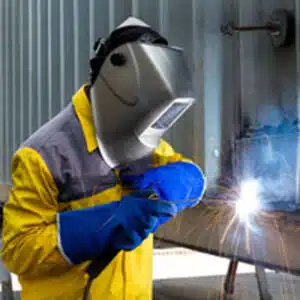A head injury is a serious injury that requires constant monitoring to prevent the condition from worsening and is much more serious than a cut or bruise on your head. “Head injury” generally refers to a Traumatic Brain Injury (TBI). A concussion is the most common example of a TBI.
Anyone who is a fan of football probably has an idea of how dangerous a concussion can be. Repeated concussions can be especially dangerous, and sometimes are contributing causes of former football players’ deaths.
Closed and Open Head Injuries
Doctors at Johns Hopkins University say two types of head injuries cause TBIs: closed brain injuries and penetrating brain injuries.
A concussion is an example of a “closed brain injury.” A hard blow to the head could damage the brain and might cause a brain bleed. A closed brain injury that is bleeding often creates more pressure that might cause a patient to become comatose and eventually die.
A fractured skull or a bullet wound would be examples of a “penetrating brain injury.” Penetrating brain injuries can also cause a comatose condition and death. Whenever the skull is fractured, the injury is classified as a penetrating brain injury.
Primary and Secondary Brain Injuries
A brain injury is not always immediately apparent. Some head injuries might be obvious immediately following the moment of impact. Such brain injuries are “primary injuries” and typically require emergency medical treatment.
“Secondary brain injuries” are less obvious and might take several hours or even several days to fully manifest themselves. A secondary brain injury follows a primary injury and causes changes to the brain’s chemistry, blood vessels, or tissue that cause additional injury.
Falling and striking your head is an example of a primary brain injury. Additional swelling and brain bleeding that might follow and possibly cause a comatose condition are examples of secondary brain injuries.
Common Ways That Workers Suffer Head Injuries
Head injuries always involve impact to the head. Most work-related head injuries have five common causes:
- Walking into a solid and stationary object
- Struck by a moving object
- Struck by a falling object
- Falling from an elevated position
- Slips, trips, and falls
A worker might not see a solid object protruding from a wall and might walk into it. It is easy to walk into overhead objects and suffer a concussion or a fractured skull, and if the object is especially pointed or has a sharp edge, it could cause a fatal head injury.
Many workers also are struck by moving objects, such as a forklift whose driver is moving a loaded pallet. Maybe the operator of a piece of construction equipment does not see a coworker and runs into that person. Many types of moving objects could cause a serious head injury.
Falling objects are especially dangerous on construction sites, where they might fall from several floors up and strike a worker on the head. A worker also might fall from an elevated position and suffer a head injury while working at a construction site.
Even when not at an elevated position, a fall can cause workers to hit their heads and suffer a serious injury. Slips, trips, and falls at the workplace very easily could cause a concussion as well.
Head Injuries Could Cause Many Potential Changes in Ability
Even a comparatively “mild” concussion can affect your ability to work. A TBI of any severity can make it more difficult for you to focus, recall information, or follow multiple instructions. You might suffer from migraine headaches, dizziness, or other issues due to a seemingly “mild” TBI.
In more serious cases, a TBI might cause you to suffer partial or full paralysis, experience poor balance, or have tremors and other physical effects. Many people report changes in sensory perception, including hearing and seeing. The condition might make it impossible for you to drive or operate heavy equipment.
After a TBI, you might have more trouble speaking, communicating, and interacting with others. You also might become more irritable and fatigued, among many other potential effects from a work-related head injury.
Workers’ Compensation Covers Work-Related Head Injuries
About one quarter of all head injuries in the United States are work-related. When you suffer a head injury while working, there is a chance that you will have to take time off of work to recover.
Workers’ Compensation should cover a trip to the emergency room and all follow-up care, including any surgeries. The insurance also should pay for any diagnostic examinations, medical treatment, and extended care.
If you miss more than three days of work, it also should provide you with benefits for lost wages. Workers’ Compensation typically pays two-thirds of your average weekly income up to the maximum number of allowable weeks.
If you suffer a permanent disability as a result of an on-the-job head injury, Workers’ Compensation should provide you with a settlement based on the type of disability.
How to Prevent Work-Related Head Injuries?
A combination of safety gear and safety training goes far in helping to limit the potential for and occurrence of work-related head injuries. It starts with safety training to help workers understand the potential dangers in the workplace and related preventative measures.
Hard hats and safety helmets can protect workers at construction sites and those who work in heavy industry. It is important that workers wear appropriate footwear and other personal protection equipment, such as harnesses when working from elevated positions, non-slip footwear appropriate to the work environment, and high-visibility clothing where appropriate.
Safety barriers, proper lighting, and backup signals for heavy equipment can help to alert workers to potential dangers. Constant inspections and policing work areas to identify dangerous conditions and dispose of debris can help to reduce the potential for work-related head injuries.
Uphold Your Rights with a Wilmington Workers’ Compensation Lawyer at Rhoades & Morrow
You can find help from an experienced Wilmington Workers’ Compensation lawyer at Rhoades & Morrow. Call us today at (302) 427-9500 or complete our online form to schedule a free consultation. With offices in all three counties of Delaware, we serve clients throughout the state.





